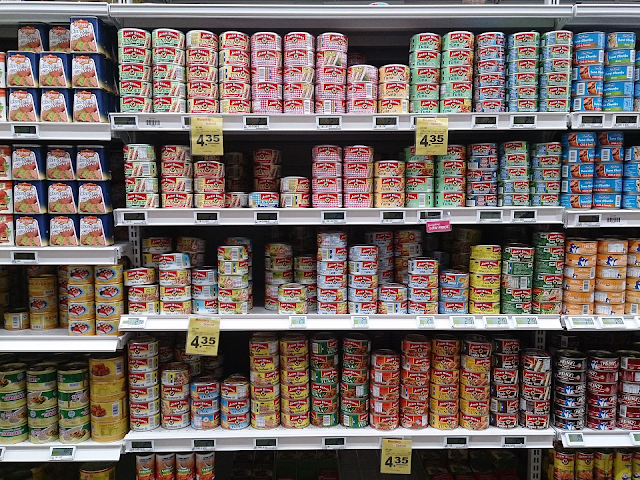Canned food usually becomes apparent while thinking about ration storage to prep for times of disaster or existence. Canned foods are widely obtainable. The pre-eminent perk of canned food is it costs lesser than fresh food. It helps you prepare a tasty and nutrient-rich meal in no time.
The never-ending lists of myths around canned food have easily confused consumers. The fiction has covered up facts. People now second guess before choosing canned items as a method of food storage.
Within this article, let us all discuss the truth behind the fables. Here, we will reveal the facts about some of the most bizarre myths surrounding canned foods and DIY food canning.
Some common myths encircling canned foods and some related facts
Myth 1: Preservative Fills Most Portions of Canned Food.
Fact > The food canning process does not require any added enhancers. Tinned food items get prepared by applying excessive pressure and heat on the ingredients. It helps to kill harmful bacteria.
Fruits are only treated at soaring temperatures before they get canned. They do not require high-pressure treatment because of their raised acidic level. Canned vegetables such as canned beans, canned potatoes, and canned meats need heat and temperature before being sealed in a can. There are no added preservatives in canned foods. In some cases, only additional seasoning and sweeteners for better taste. The sealant on the lid of the can prevents any bacteria growth inside.
Myth 2: Canned Food is Less Nutrient-Dense Than Natural or Preserved Food.
Fact> The most nourishing food item is fresh produce. The more fresh products you eat more alimental value the meal has. Contrary to famous beliefs, the majority of nutrient content remains retained in canned foods.
Myth 3: Canned Food is Always Processed.
Fact> Cooking is also a form of food processing. Wholesale Canned foods get processed in the same way that cooked prepared foods are. The prime distinction between cooked meals and canned food lies in the processing technique of the ingredients. Tinned food items get treated at a much higher temperature and pressure. Then they get sealed in an airtight tin can.
Myth 4: Canned Food Does Not Taste Good.
Fact> Well, who doesn't like canned peaches! Store-bought, processed peaches taste delightful. Food items canned just after the harvest will retain maximum flavors. Often it can taste good if stored in a cool and dry space way past its date of expiration.
Myth 5: Sodium Content is Notably High Within Canned Food.
Fact> Several canned food items have sodium in them. Sodium gets added only as much as needed for taste. But if you are concerned, then there are several low-sodium options to choose from.
Myths and facts on canning food by yourself
The myths and factual information presented above pertain to canned food, purchasable at any grocery shop or convenience store. Many people prefer to preserve their food by packaging it in cans or jars. One should be well aware of the procedure of canning before they try it themselves. Lack of knowledge can turn into a disaster while canning foods. So, here are a few truths and fiction to consider when storing your edibles.
Myth 1: Boiling Veggies For An Extended Time Prepare Them For Canning.
Fact> Only highly acidic ingredients like fruits can be canned after boiling at high temperatures. Other food items require both excessive temperature and extreme pressure for getting canned properly.
Myth 2: Food Can Be Safely Canned in An Oven.
Fact> Ovens aren't suitable for the method of canning of food.
Myth 3: Any Type of Jar Is Suitable For Canning.
Fact> Canning cannot be done in any type of jar. Mason jars with new covers are the best choice for food preservation. If you're reusing mason jars, make sure to replace the cap or cover in between each canning session.
Myth 4: Paraffin Wax is Suitable To Seal Jars of Jam And Jelly.
Fact> Paraffin wax is unsuitable for canning because it cannot form an airtight seal. Using paraffin wax can promote bacterial growth inside the jar.
Myth 5: Salsa Recipes Can Be Canned in A Water Bath Canner.
Fact> It does not apply to all types of Salsa. Salsa recipes containing highly acidic ingredients can only be processed in a water pressure canner.
Top Lesser Known Facts About Canned Foods
● Canned foods have enough nutrients to fulfill the nutritional needs of a person. Canned food contains important nutrients such as fibers, proteins, carbohydrates as well as vitamins and minerals. But according to a survey, only about 42% of Americans understand that canned food possesses enough nutrients to meet the USDA dietary recommendations.
● You can maintain your sodium levels while enjoying canned food. Only 1% of sodium intake of a consumer's diet consists of canned food. There are several low sodium can food options available now. Quickly draining and rinsing the canned food can reduce the sodium contains by up to 41%.
● Steel cans are the safest packaging for canned foods.
●
Minimal food processing is involved in
the process of canning.
Conclusion
No, preparing meals from canned foods is not a copout; it has nothing to do with bad health. In fact, it’s a shortcut that is both time and cost-effective. Further, using canned foods can potentially add more nutrition, flavor, and intrigue to any given meal.
While the myths seem to be busted, remember, canned foods are
environmentally sound choices, too!










0 Comments